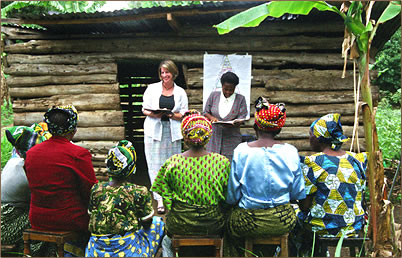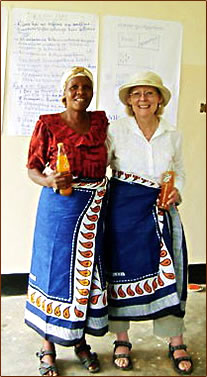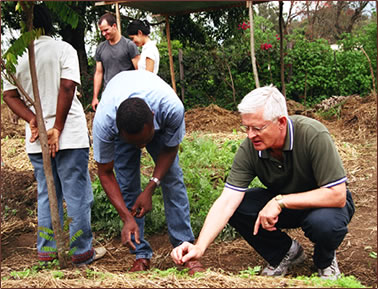

Jan Taylor digs right in with men preparing a garden trench.

By Jan Taylor
Images courtesy of Global Service Corps
A person would have to be pretty soulless to remain unmoved by Africa’s current woes. Thanks to TV news, tales about Africans dying on an epic scale from famine, war and disease seem to intrude almost daily into our comfortable lives here in the developed world. So what’s to be done? Besides the usual options of lobbying politicians and giving to strategic charities, there is another option: you can cut out the middlemen and go to troubled countries yourself, offering practical service and encouragement as a short-term volunteer.

Workshop classrooms can be indoors or outdoors in Tanzania!
In 2006 I fulfilled a lifelong ambition by spending a month as a volunteer in Tanzania with US-based Global Service Corps (GSC). I am in my mid-50s, now free of commitments that would previously have held me back. I am fit, and reasonably secure financially. So I signed up with GSC which offers volunteer programs in both Tanzania and Thailand, to work on a sustainable agriculture project.

There is always time for shared fun!
The reaction of friends and family to this news was in itself interesting. Some were impressed that I could countenance the prospect of roughing it for four weeks, even foregoing a hairdryer! Others clearly disapproved. Their arguments – although much more politely phrased – focused on the dangers of creating a dependency culture among Africans, or of patronising them: was it really ok, they questioned, to ‘pop in’ and tell them how to run their lives? One or two of my acquaintances even felt that we do “happy” Africans no favours at all by introducing them to the wealth that brings so much misery to our own society.
I was undaunted. If 30 years of journalism have taught me anything, it’s not to make prior assumptions. So off I went with what I hoped was an open mind. I’m glad I did. For the experience probably did far more for me than it did for the wonderful Tanzanians I met.
![]()
As part of the exercise, my American volunteer colleague Rachel and I were assigned to visit a group of farmers in the village of Ambrea Moivaro in northern Tanzania. Our mandate was to see how well they were assimilating the principles of sustainable farming (previously taught by GSC) into their daily agricultural practices and to help with queries.
On the surface this seemed a bit rich. They farm for a living, while I have a small, rather unkempt garden that supports a bedraggled selection of shrubs: I have never knowingly eaten anything from it. That this was not a patronising exercise was due to a number of more subtle factors. For a start, we were accompanied by Evans Javason – an African whose knowledge of bio-intensive agriculture was light years beyond our own. He was our translator and generally co-ordinated proceedings, making it clear that this was an African-led incentive, to which Rachel and I, as representatives from the developed world, were indicating our support. As exotic outsiders, we provided curiosity that drew people’s interest in methods to improve soil fertility, and as such justified our presence.

Sustainable agriculture techniques are taught in the field.
But it didn’t stop there. When the difficulties of water harvesting and storage were raised, Rachel had personal experience on which to draw. When the best ways to market surplus produce were being debated, my professional knowledge proved useful. In this way, we were both able to bring something to the party that would not otherwise have been available – and in such a way that was not remotely patronising.

Homestays enable volunteers to develop rich relationships with family hosts of all ages!.

What about creating a dependency culture? Nobody wants Africans to laze around assuming that others will pick up the bill. Of course, when people are actually on the brink of starvation, hand-outs are the only things keeping them alive. But initiatives like GSC’s Sustainable Agriculture Project aim to point the way: we were introducing them to better ways of farming, but we were definitely not doing the work for them!
Our Urony farmers were kind, generous, hard working and intelligent. However, it was clear that things we take for granted, like education and access to credit, are simply not available to them. With an average annual income of around $200, they cannot afford to educate their children so there is little chance of stepping into a better life. And although the construction of a few concrete tanks to capture water during the wet season would greatly lessen the problem of drought during the rest of the year, without the money for this, they were stymied.

Visiting volunteers are valued and honored in many small but touching ways.
The upshot is that with a personal appreciation of the challenges, Rachel and I have become highly motivated to drum up finance for the concrete wells now we are back in our home countries. Our reasoning is that better irrigation means better crops means better income – and that all this leads to extra funding for education and healthcare for local people. Far from creating dependency, these baby steps will, we hope, break old economic patterns and create greater independence for further initiatives. Yes, that can make you feel like Bill Gates. I am far from rich in my own country, but in our rural Tanzanian environment, we saw how the sacrifice of small sums to us could make a life-changing difference to them.

Jan and Agnes share a moment of delight.
I still can’t get over how fortunate I was to meet Agnes. This dear little soul is the daughter of one of the Urony farmers who is a single mum whose daily life is a struggle to make ends meet. With very little education, Agnes’s options in life were negligible. However, for a relatively small sum each year, I am paying for an education for her that will transform her prospects. At the same time, I have secured a life-long link with a group of people I grew very fond of and with a country of stunning, if improperly exploited, beauty.
Firsthand experience of real poverty is shocking. It is difficult to understand what it means to have virtually nothing until you see it for yourself. More than ever I realise how lucky we are in the developed world to be born into affluence.
Yet there is so much about the Tanzanian way of life that I envy. The generosity of people who have so little is humbling, and their politeness and concern for each other make our society seem greedy, selfish and uncaring. The adoption of our ‘values’ is the last thing one would wish on them. Perhaps poverty is better for the soul than wealth. But surely nobody relishes a life cut short by need and preventable disease. There has to be a balance, but where that lies is a question I will leave to others.
In the meantime, I will cherish my link with Africa and the mutual, beneficial exchange it has provided. For me, volunteering abroad has already been a life-changing experience where my first “testing of the waters” has led me to bigger things. After I returned home, I signed up with Britain’s Volunteer Service Overseas (similar to the American Peace Corps) for a two-year assignment as a Communications Advisor in Cambodia. My next adventure begins in March 2007.
 Global Service Corps is a nonprofit international volunteer organization providing service-learning opportunities to live and work in Thailand, Cambodia and Tanzania. Year-round programs from two weeks to six months offer cultural immersion with homestays or in independent accommodations, while working with local counterparts. Personalized service-learning programs, including HIV/AIDS Prevention, Sustainable Agriculture (for nutrition and hunger relief), Healthcare, English Instruction, Buddhist Immersion, and the Seeds of Sustenance Fellowship, begin with in-depth training sessions, and provide rewarding hands-on challenges for volunteers. About 30 percent of volunteers are older adults. Check out more details at the website: www.globalservicecorps.org
Global Service Corps is a nonprofit international volunteer organization providing service-learning opportunities to live and work in Thailand, Cambodia and Tanzania. Year-round programs from two weeks to six months offer cultural immersion with homestays or in independent accommodations, while working with local counterparts. Personalized service-learning programs, including HIV/AIDS Prevention, Sustainable Agriculture (for nutrition and hunger relief), Healthcare, English Instruction, Buddhist Immersion, and the Seeds of Sustenance Fellowship, begin with in-depth training sessions, and provide rewarding hands-on challenges for volunteers. About 30 percent of volunteers are older adults. Check out more details at the website: www.globalservicecorps.org
Based in Britain, Jan Taylor has been an author, editor and journalist for 30 years mainly working for magazines and in public relations. She has a PhD in Journalism and has done some teaching and research work on media topics and served as editor of medical education materials for doctors. We wish Jan the best of luck with her new two-year assignment in Cambodia with Volunteer Service Overseas!
 Founded in 2010 by local Tanzanians, Focus in Africa organizes tailor-made volunteer programs and wildlife adventures for solo travelers or groups of friends and multi-generational family. Whether planning a safari, a mountain trek or a volunteer program, we support our guests every step of the way with meaningful adventures at affordable prices! www.focusinafrica.com
Founded in 2010 by local Tanzanians, Focus in Africa organizes tailor-made volunteer programs and wildlife adventures for solo travelers or groups of friends and multi-generational family. Whether planning a safari, a mountain trek or a volunteer program, we support our guests every step of the way with meaningful adventures at affordable prices! www.focusinafrica.com
Feel free to explore other stories with an African theme for vacations well suited to senior travelers, their families and friends. Click on the titles below to read each inspiring article.
Best video tips for holiday adventure.
Volunteer for wildlife in Africa.
Access Africa with limited mobility.
Would you climb Mt. Kilimanjaro?
Okavango Delta Walking Safari.
African wildlife photography tips.
The language of African elephants.
Cheetah volunteer vacation.
South African walking safari.
